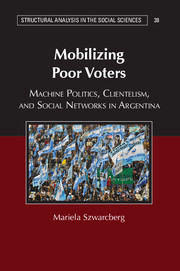Book contents
- Frontmatter
- Dedication
- Contents
- Acknowledgments
- 1 Mobilizing Poor Voters
- 2 The Microfoundations of Political Clientelism
- 3 Building a Party Network: Political, Partisan, and Social Networks in Argentina
- 4 Moral Hazard and Asymmetric Information Networks
- 5 The Logic of Perverse Incentives
- 6 Scaling Up: The Logic of Perverse Incentives at the Subnational Level
- 7 Mobilizing Poor Voters: A Comparative Perspective
- 8 Conclusions: Winners Lose
- Notes
- References
- Index
5 - The Logic of Perverse Incentives
Published online by Cambridge University Press: 05 November 2015
- Frontmatter
- Dedication
- Contents
- Acknowledgments
- 1 Mobilizing Poor Voters
- 2 The Microfoundations of Political Clientelism
- 3 Building a Party Network: Political, Partisan, and Social Networks in Argentina
- 4 Moral Hazard and Asymmetric Information Networks
- 5 The Logic of Perverse Incentives
- 6 Scaling Up: The Logic of Perverse Incentives at the Subnational Level
- 7 Mobilizing Poor Voters: A Comparative Perspective
- 8 Conclusions: Winners Lose
- Notes
- References
- Index
Summary
The logic of perverse incentives in which political leaders promote candidates based solely on the number of voters they mobilize leads to the emergence and consolidation of mercenary candidates. Like other candidates already discussed in the preceding chapters, mercenary candidates are rewarded based on the number of voters they mobilize, but mercenaries are concerned only with getting material rewards in exchange for their political work rather than with any other consequences of their actions. As a result, mercenaries will distribute small goods, welfare benefits, public jobs, and even money, alcohol, and drugs to voters in exchange for political participation.
The emergence of mercenary candidates induces other candidates who are capable of using clientelism to employ that strategy; they know that poor voters will follow whoever provides them with benefits. Thus, office-seeking party activists who cannot afford to lose followers are perversely encouraged to use clientelism. I refer to the logic of perverse incentives as having unintended consequences because mercenary candidates can pose several unexpected challenges to party leaders. For example, mercenary candidates can prefer to use their capacity to mobilize political support for the opposition or for themselves, thus challenging the authority of party leaders in their territories. In addition, the consolidation of mercenary candidates helps to explain current crises of political legitimacy and representation that have considerably handicapped governments’ capacity to effectively administer public policies. In short, the consolidation of mercenary candidates illustrates the effects of the logic of perverse incentives in Argentina.
Choosing Clientelism
The first time a party candidate makes the decision to use clientelism, he or she is making a choice that will define the candidate's political future. I propose a sequential theory of strategic decision making in which candidates’ decisions about whether or not to use clientelism to mobilize poor voters affect the possibilities available to them.
- Type
- Chapter
- Information
- Mobilizing Poor VotersMachine Politics, Clientelism, and Social Networks in Argentina, pp. 86 - 104Publisher: Cambridge University PressPrint publication year: 2015

